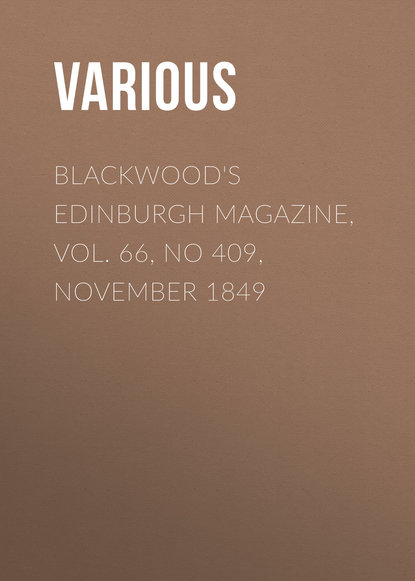По всем вопросам обращайтесь на: info@litportal.ru
(©) 2003-2024.
✖
Blackwood's Edinburgh Magazine, Vol. 66, No 409, November 1849
Автор
Год написания книги
2017
Настройки чтения
Размер шрифта
Высота строк
Поля
SEWARD.
See, sir, how precisely this characteristic is proposed.
BULLER.
By whom?
SEWARD.
By Shakspeare, in that first Soliloquy. The poetry colouring, throughout, his discourse, is its natural efflorescence.
NORTH.
Talboys, Seward, you have spoken well.
BULLER.
And I have spoken ill?
NORTH.
I have not said so.
BULLER.
We have all Four of us spoken well – we have all Four of us spoken ill – and we have all Four of us spoken but so-so – now and heretofore – in this Tent – hang the wind – there's no hearing twelve words in ten a body says. Honoured sir, I beg permission to say that I cannot admit the Canon laid down by your Reverence, an hour or two ago, or a minute or two ago, that Macbeth's extravagant language is designed by Shakspeare to designate hypocrisy.
NORTH.
Why?
BULLER.
You commended Talboys and Seward for noticing the imaginative – the poetical character of Macbeth's mind. There we find the reason of his extravagant language. It may, as you said, be cant and fustian – or it may not – but why attribute to hypocrisy – as you did – what may have flowed from his genius? Poets may rant as loud as he, and yet be honest men. "In a fine frenzy rolling," their eyes may fasten on fustian.
NORTH.
Good – go on. Deduct.
BULLER.
Besides, sir, the Stage had such a language of its own; and I cannot help thinking that Shakspeare often, and too frankly, gave in to it.
NORTH.
He did.
BULLER.
I would, however, much rather believe that if Shakspeare meant anything by it in Macbeth's Oratory or Poetry, he intended thereby rather to impress on us that last noticed constituent of his nature – a vehement seizure of imagination. I believe, sir, that in the hortatory scene Lady Macbeth really vanquishes – as the scene ostensibly shows – his irresolution. And if Shakspeare means irresolution, I do not know why the grounds thereof which Shakspeare assigns to Macbeth should not be accepted as the true grounds. The Dramatist would seem to me to demand too much of me, if, under the grounds which he expresses, he requires me to discard these, and to discover and express others.
SEWARD.
I do not know, sir, if that horrible Invocation of hers to the Spirits of Murder to unsex her, be held by many to imply that she has no need of their help?
NORTH.
It is held by many to prove that she was not a woman but a fiend. It proves the reverse. I infer from it that she does need their help – and, what is more, that she gets it. Nothing so dreadful, in the whole range of Man's Tragic Drama, as that Murder. But I see Seward is growing pale – we know his infirmity – and for the present shun it.
SEWARD.
Thank you, sir.
NORTH.
I may, however, ask a question about Banquo's Ghost.
SEWARD.
Well – well – do so.
TALBOYS.
You put the question to me, sir? I am inclined to think, sir, that no real Ghost sits on the Stool – but that Shakspeare meant it as with the Daggers. On the Stage he appears – that is an abuse.
NORTH.
Not so sure of that, Talboys.
TALBOYS.
Had Macbeth himself continued to believe that the first-seen Ghost was a real Ghost, he would not, could not have ventured so soon after its disappearance to say again, "And to our dear friend Banquo." He does say it – and then again diseased imagination assails him at the rash words. Lady Macbeth reasons with him again, and he finally is persuaded that the Ghost, both times, had been but brain-sick creations.
"My strange and self-abuse
Is the initiate fear, that wants hard use: —
I am but young in deed."
BULLER.
That certainly looks as if he did then know he had been deceived. But perhaps he only censures himself for being too much agitated by a real ghost.
TALBOYS.
That won't do.
NORTH.
But go back, my dear Talboys, to the first enacting of the Play. What could the audience have understood to be happening, without other direction of their thoughts than the terrified Macbeth's bewildered words? He never mentions Banquo's name – and recollect that nobody sitting there then knew that Banquo had been murdered. The dagger is not in point. Then the spectators heard him say, "Is this a dagger that I see before me?" And if no dagger was there, they could at once see that 'twas phantasy.











